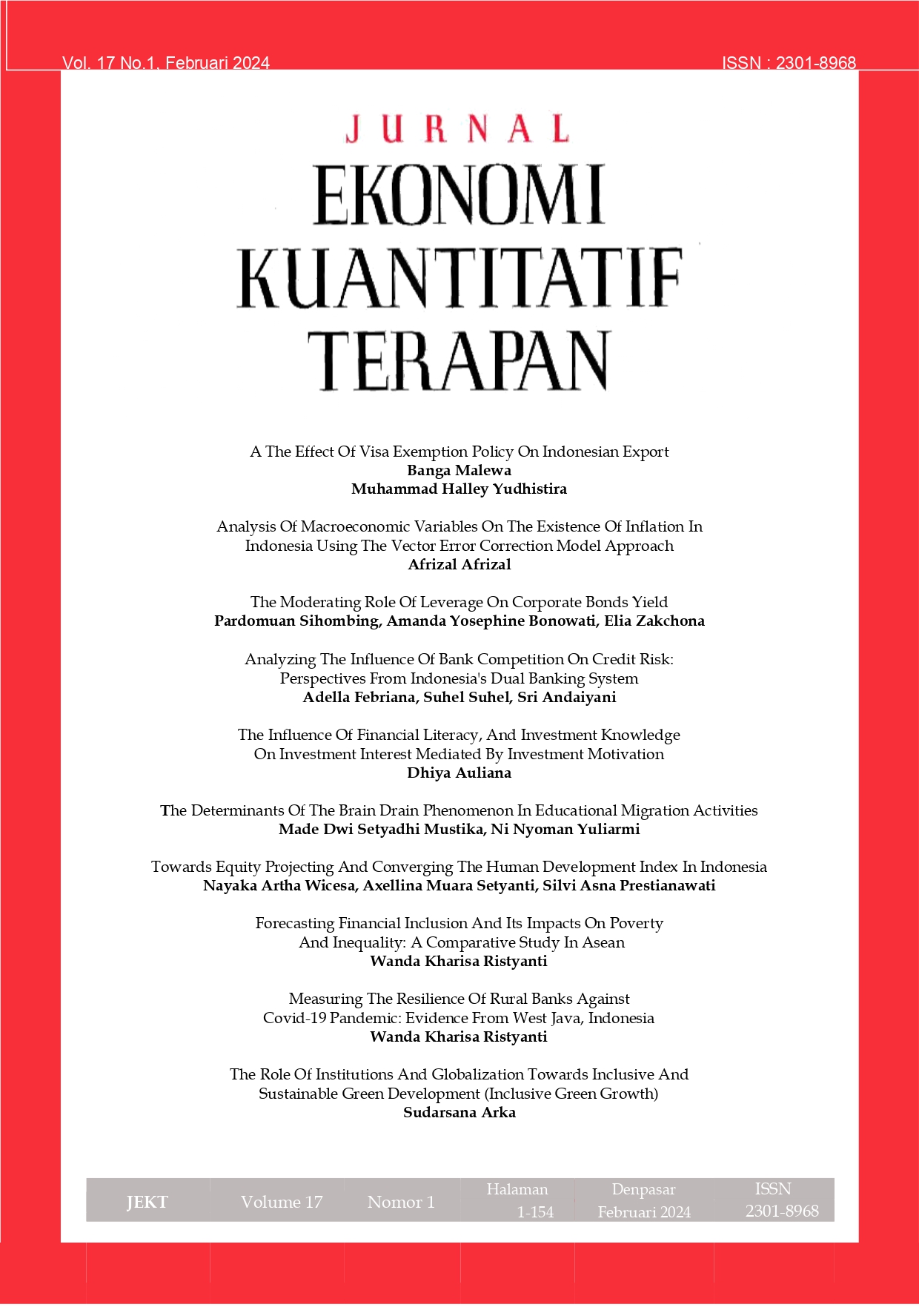The Determinants of The Brain Drain Phenomenon in Educational Migration Activities
Abstract
During this time, the main reason someone migrates is related to the motivation to get a better job. However, the other reason that can not be ignored is the expectation to get the opportunity of having a higher level of education. A phenomenon that occurs following the educational migration is many educational migrants did not return to their origins after finishing their studies, and would choose to work in the destinations. This phenomenon is known as brain drain, which refers to the condition where the educational migrants did not return to their origins after fisnishing their studies in the destinations. This study covers educational migration activities between regions in Indonesia, so the term used to describe this condition is the domestic brain drain.
This study aimed to analyze the determinant of the brain drain phenomenon in educational migration activities. By using panel data of the Indonesian Family Life Survey (IFLS) wave 5, which were processed using the Logistic Regression Model method, the result suggested that about 49.08 percent of educational migrants in Indonesia chose not to return to their origins after finishing their studies. They decided to work in the destination or in other areas outside the area of their origins. Their decisions were significantly affected by the amount of salary/income, marital status, location of parents' residence, health facilities, sex, age, age square, province of the origin, and geographical. Partially, marital status, the residence of the parents, age square, and geographical, have a negative impact to migrant’s decision. Meanwhile, health facilities, sex, and age have a positive impact to migrant’s decision.
Downloads
References
Andriani, F. (2016) Dampak Migrasi pada Daerah Tujuan (Perkotaan).
Andy Cahyono, S., Ainun Jariyah, N. and Indrajaya, Y. (2006) ‘KARAKTERISTIK SOSIAL EKONOMI YANG MEMPENGARUHI PENDAPATAN RUMAH TANGGA PENYADAP GETAH PINUS DI DESA SOMAGEDE, KEBUMEN, JAWA TENGAH’, Jurnal Penelitian Sosial dan Ekonomi Kehutanan [Preprint]. doi:10.20886/jpsek.2006.3.2.147-159.
Badan Pusat Statistik. 2016. Statistik Migrasi Indonesia, Hasil Survei Antar Penduduk Sensus 2015. BPS Indonesia: Jakarta.
Chiang, Y., Hannum, E. and Kao, G. (2012) ‘Who Goes, Who Stays, and Who Studies? Gender, Migration, and Educational Decisions among Rural Youth in China’, International Journal of Chinese Education [Preprint]. doi:10.1163/221258612X644584.
Choe, H. and Son, E. (2018) ‘Southeast Asian ESL countries as study abroad destinations: A Korean perspective: Korean educational migration to the Outer Circle for English language learning’, English Today, 34(2), pp. 46–52. doi:https://doi.org/10.1017/S0266078417000451.
Elena Y.Kosheleva; Elena I.Samofalova; Carl Holtman; Yana E.Kopotilova. 2015. Chinese Students in Russia: Causes of Migration and Basic Educational Behavioral Tenets. Procedia - Social and Behavioral Sciences, Volume 215, Pages 38-42.
Hariyanto. 2008. Brain Drain, Masalah Besar Bagi Negara Berkembang. Artikel. Jurusan Ekonomi Pembangunan Fakultas Ekonomi Universitas Sebelas Maret: Surakarta.
Hendajany, N., Widodo, T. and Sulistyaningrum, E. (2016) ‘Perkembangan Tingkat Pengembalian Investasi Pendidikan Antar-Provinsi: Indonesia Family Life Survey 1993–2014’, Jurnal Ekonomi dan Pembangunan Indonesia [Preprint]. doi:10.21002/jepi.v17i1.647.
Hohsung Choe and Eunmi Son. 2018. Southeast Asian ESL Countries as Study Abroad Destinations: A Korean Perspective: Korean Educational Migration to The Outer Circle for English Language Learning. English Today, Vol. 34, Issue 2, Pages 46-52.
Hongsheng Chen, Y.L., Zhu, Z. and Zhigang Li (2017) ‘Does Where You Live Matter to Your Health? Investigating Factors that Influence the Self-rated Realth of Urban and Rural Chinese Residents: Evidence Drawn from Chinese General Social Survey Data’, Health Qual Life Outcomes, 15(1). doi:https://doi.org/10.1186/s12955-017-0658-0.
Hrynkevych, O. (2017) ‘Cross-border factor of educational migration of Ukrainian youth to Poland: Social-economic opportunities and threats’, Economic Annals-XXI [Preprint]. doi:10.21003/ea.V163-05.
Khotijah, S. (2008) Analisis Faktor Pendorong Migrasi Warga Klaten ke Jakarta, Universitas Diponegoro Semarang.
McQuaid, Ronald and Hollywood, Emma. 2008. Educational Migration and Non-return in Northern Ireland. Management, Work and Organisation Research Reports: STORRE, Stirling Online Research Repository.
Natalia Stepaniuk. 2017. Development of Educational Migration in Ukraine. Annuals of Marketing Management & Economics Vol. 3, No. 2, Pages 101–111.
Olha Hrynkevych. 2017. Cross-Border Factor of Educational Migration of Ukrainian Youth to Poland: Social-Economic Opportunities and Threats. Journal: Economic Newsletter-XXI, 163/2017, Pages 26-30: Central and Eastern European Online Library.
Tamar Mikadze. 2002. Crisis in Higher Education and Educational Migration from Georgia. Central Asia and The Caucasus (CA&C) Press: AB Publishing House.
Utari, Ida Ayu Made Dwi. 2018. Return on Education Tenaga Kerja di Indonesia. Skripsi. Fakultas Ekonomi dan Bisnis Universitas Udayana: Denpasar.
Yelena Sadovskaya. 2013. Educational Migration from Kazakhstan to China: A Shift Eastward?. The Central Asia-Caucasus Institute (CACI) Analyst.




















